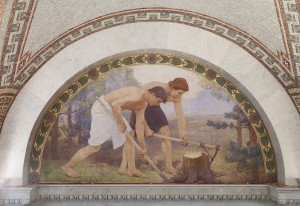While we prepare for the last long weekend of the summer ? or shop for school supplies ? let us pause to remember the historic significance of Labor Day and the men and women who fought for workers? rights.
In 1894, Congress passed legislation making Labor Day ? the first Monday in September ? a national holiday. This move came just a few weeks after the bloody Pullman Company Strike in Chicago, which resulted in the death of 34 members of the American Railway Union.
Folklorist Archie Green, upon whom the Library recently bestowed a Living Legend medal, has spent a lifetime studying the history and culture of the labor movement. The award was accepted by his son during a two-day symposium devoted to ?laborlore.? (More information about the event and the Library?s laborlore collections can be found here.)
Green, who coined the term ?laborlore,? is also regarded as the founding father of the Library?s American Folklife Center (AFC). He spent a decade lobbying Congress to establish a center to preserve and present American folklife. His vision became a reality on Jan. 2, 1976, when President Gerald R. Ford signed the bill establishing the AFC.
A search on the term ?labor? on the Library?s Web site will uncover a wealth of materials in all formats about the labor movement in the United States. From Lewis Hine?s (1874-1940) stirring photographs documenting child labor and a teachers? lesson plan for studying this subject, to a Thomas Edison film (ca. 1904) of a Labor Day parade in Massachusetts or a webcast of the Library?s women?s studies specialist discussing ?Rosie the Riveter: Real Women Workers in World War II,? the Library?s collections allow researchers, educators and students to study this broad topic from many different angles.
(The image in this post, ?Labor,? is a mural in the Thomas Jefferson Building of the Library of Congress; photo by Carol Highsmith, who recently donated hundreds of photos of the TJB to the Library. Thanks to Audrey Fischer with help researching and writing this post.)

